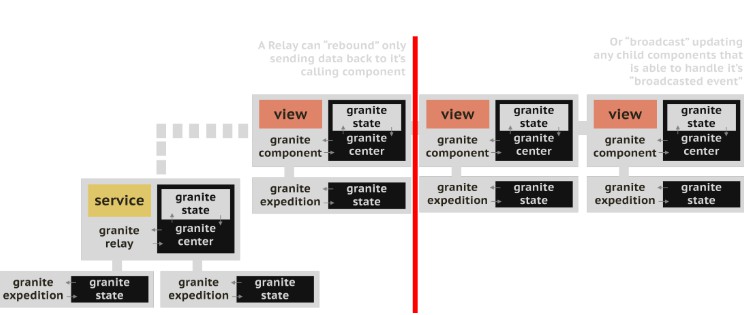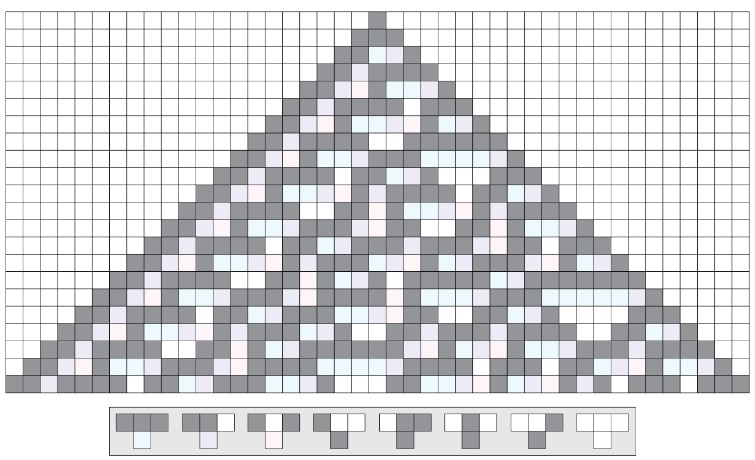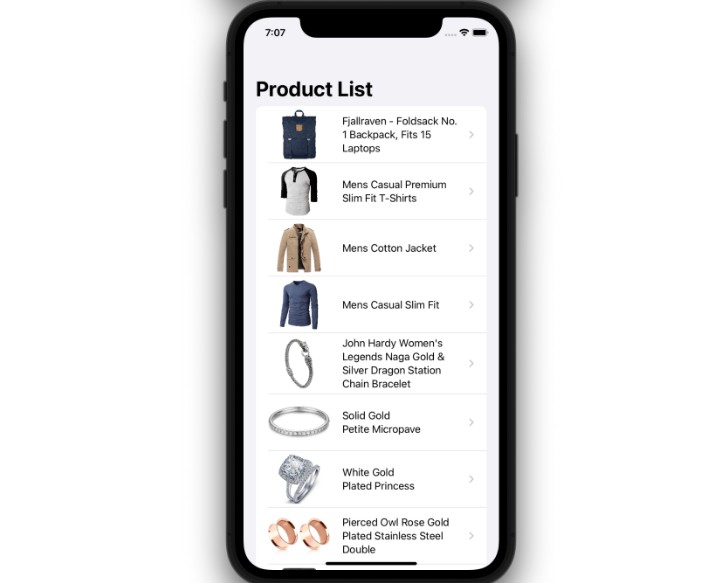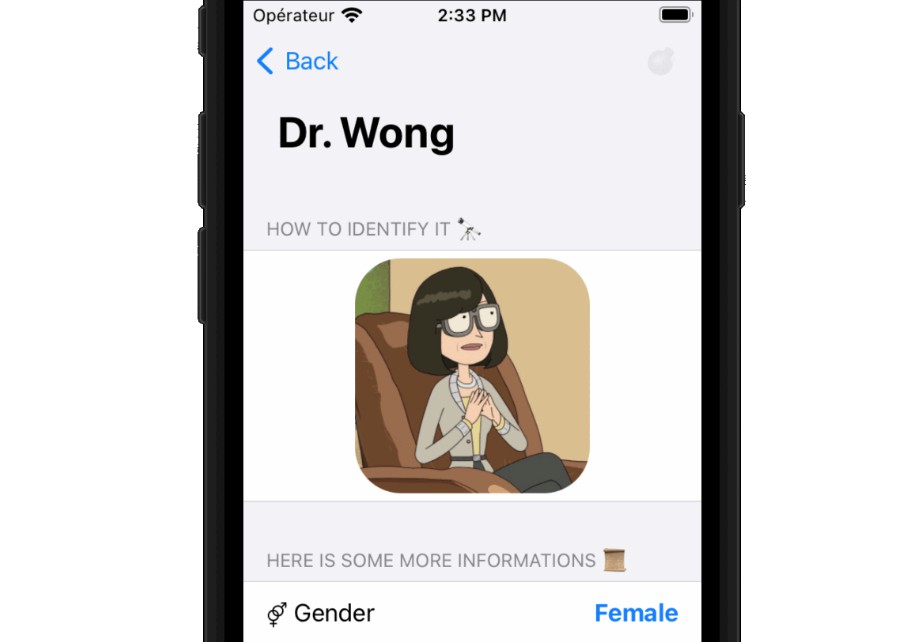GraniteUI – v0.0 – WIP
A powerful SwiftUI Architecture that merges Redux event handling and state management with functional programming. While bringing powerful workflows to streamline CoreML/Metal work and to interact with ground-breaking services like IPFS.
The Granite architecture provides:
- Testability and Isolation. Routing, business, view logic, have independant classes/protocols to be inherited. Each component is positioned to be decoupled and independant from eachother.
- Tooling for developer productivity. Granite comes with pre-built components to streamline Metal, CoreML integration as well as UserDefault-backed local storage solutions.
- View Library. Granite comes with a comprehensive view library that can speed up development, offering thought out button templates and other UX solutions.
- IPFS capability, any media type you handle with Granite’s framework can be pinned and distributed from IPFS with ease. Based on: https://github.com/ipfs-shipyard/swift-ipfs-http-client
High Level Overview
The
Docsfolder has usage examples for each file. Some are still WIP.
- GraniteComponent (80%)
- GraniteCommand (50%)
- GraniteCenter (50%)
- GraniteState (90%)
- GraniteExpedition (Reducers) (90%)
- GraniteCenter (50%)
- GraniteCommand (50%)
- GraniteRelay (80%)
- GraniteService (50%)
- GraniteCenter (50%)
- GraniteState (90%)
- GraniteExpedition (Reducers) (90%)
- GraniteCenter (50%)
- GraniteService (50%)
- GraniteEvent (80%)
- GraniteBeam (80%)
- GraniteBeamType (80%)
- GraniteML (25%)
- GraniteIPFS (25%)
- GraniteMetal/MarbleKit (0%)
- Types (3%)
- GraniteConnection (0%)
- GraniteSatellite (0%)
- GraniteAdAstra (10%)
- GraniteDock (0%)
- GraniteLaunch (0%)
- GraniteConnection (0%)
Documentation is a work in progress. Reference the above for progress. It is to show the main types one may experience when using the architecture. An example Application is provided to speed-up bootstrapping an application with Granite until Documentation is updated further.
Every SwiftUI View is a GraniteComponent with business logic handled in reducer like design standards (Expeditions) with distinct state files to hold mutable data.
GraniteRelays are modular Services lightweight components that can handle non UI dependant actions updating data globally to any components hosting them. The GraniteCenter distinctly defines your rules of Services which are known as GraniteRelays allowed to be accessed. GraniteCenters also allow the definition of Reducers and Dependencies the component requires. It is the cornerstone of a GraniteComponent.
GraniteComponent & GraniteRelay
GraniteComponent
import GraniteUI
public struct MainComponent: GraniteComponent {
@ObservedObject
public var command: GraniteCommand<MainCenter, MainState> = .init()
public init() {}
public var body: some View {}
}
Base GraniteComponent classes resemble SwiftUI View classes, but have the ability to modularize object states, events, and business logic. Let the View class only be UI/UX, divide responsibility of code, to make it easier to develop complex experiences.
@ObservedObject
public var command: GraniteCommand<MainCenter, MainState> = .init()
The ObservedObject is crucial for a component to see it’s relevant State file and Center file. Centers handle the pre-loading and linking of reducers, services and constants a View class would need to access, while helping the State be available for Reducers to mutate and be read from a View file for UX based decisions on state data.
GraniteRelay
public struct MarqueRelay: GraniteRelay {
@ObservedObject
public var command: GraniteService<MarqueCenter, MarqueState> = .init()
public init() {}
public func setup() {}
public func clean() {}
public func cancel() {}
}
GraniteRelays resemble microservices floating specialized logic that can attach to host components to deliver specific tasks.
In a functional datapath, re-draws are expensive when data updates within Components. We can control this with distinct enum flags when sending updates to a relay’s or a component’s own expeditions.
In an app that is displaying realtime financial data of stocks or securities. It’s cheaper and more effecient to have a singular service to contact a back-end service to retrieve updates once. The challenge to update all components in an application to handle these updated changes can be handled via a GraniteRelay and
broadcasting.
GraniteCenter & GraniteState
public enum ListenStage {
case listening
case none
}
public class ListenState: GraniteState {
var exhibitionStage: ExhibitionStage
var stage: ListenStage = .none
var intent: ExhibitionIntent
var wantsToListen: Bool = false
public init(stage: ExhibitionStage, intent: ExhibitionIntent) {
self.exhibitionStage = stage
self.intent = intent
}
public required init() {
self.exhibitionStage = .none
self.intent = .none
}
}
public class ListenCenter: GraniteCenter<ListenState> {
@GraniteDependency
var envDependency: EnvironmentDependency
public override var expeditions: [GraniteBaseExpedition] {
[
ListenStageExpedition.Discovery(),
ListenPermissionsExpedition.Discovery(),
RadioExpedition.Discovery(),
StopExpedition.Discovery()
]
}
public override var links: [GraniteLink] {
[
.onAppear(ListenEvents.Prepare(), .dependant)
]
}
public override var behavior: GraniteEventBehavior {
.broadcastable
}
}
A basic state file contains both the Center and State classes, one could seperate them, but they are together for maintaining easy context of defined expeditions in a Center and state variables required within each.
This file is referencing a component called ListenComponent a view that handles a music player.
@GraniteDependency
var envDependency: EnvironmentDependency
We will dive into this later in the README, but defining a usable dependency for easy access of shareable mutable data of multiple components. Can be updated directly from a view with a specialized setter, with a preference to update within expeditions exclusively.
public override var expeditions: [GraniteBaseExpedition] {
[
ListenStageExpedition.Discovery(),
ListenPermissionsExpedition.Discovery(),
RadioExpedition.Discovery(),
StopExpedition.Discovery()
]
}
Expeditions are Granite’s Reducers, they need to become executable .Discovery() does this making them available in the frameworks’ back-end when being searched for. An associatedtype of a relevant Event is used to link a expedition with it’s calling function. We’ll get into this in the GraniteExpedition section of the README.
public override var links: [GraniteLink] {
[
.onAppear(ListenEvents.Prepare(), .dependant)
]
}
Bringing viewDidAppear‘s handling in UIKit to SwiftUI. Fire events on a components appear, setting flags like dependant which runs the event only once @GraniteDependency wrapped deps are linked to the component or .always firing the event every time a component loads/re-draws.
public override var behavior: GraniteEventBehavior {
.broadcastable
}
Components can use GraniteEventBehaviors as well. When referencing the last visual, a broadcastable allows this component to be searched for expeditions to execute based on a parent or this component’s services update. Other options like .quiet (default) allow it to be skipped to improve performance.
GraniteEvent
GraniteButtonComponent(state: .init("♫_le_Verre",
textColor: Brand.Colors.white,
colors: [Brand.Colors.yellow, Brand.Colors.purple],
padding: .init(Brand.Padding.medium,
Brand.Padding.small,
Brand.Padding.medium,
Brand.Padding.small),
action: {
sendEvent(ListenEvents.Radio.Begin()) // <---
}))
Events are easy to send from a View’s action handler in a component.
struct ListenEvents {
public struct Listen: GraniteEvent {
public struct Permissions: GraniteEvent {
public var behavior: GraniteEventBehavior {
.quiet
}
}
}
}
Defined in a seperate file. Events can come with pre-defined behaviors without specifying a GraniteBeamType in the sendEvent action.
sendEvent(ListenEvents.Radio.Begin(), haptic: .light)
Easily setup haptic responses with an additional parameter.
public enum GraniteHaptic {
case light
case none // default
}
Currently supported haptic types, more to be added.
GraniteExpedition
import GraniteUI
import Combine
import MarbleKit
import Foundation
struct ListenPermissionsExpedition: GraniteExpedition {
typealias ExpeditionEvent = ListenEvents.Listen.Permissions
typealias ExpeditionState = ListenState
func reduce(
event: ExpeditionEvent,
state: ExpeditionState,
connection: GraniteConnection,
publisher: inout AnyPublisher<GraniteEvent, Never>) {
if GlobalDefaults.Permissions.Listen.canListen {
connection.request(ExhibitionEvents.Glass.Listen(), .contact)
state.wantsToListen = false
state.stage = .listening
} else {
#if os(macOS)
AVCaptureDevice.requestAccess(for: .audio) { granted in
if granted {
storage.update(GlobalDefaults.Permissions.Listen.on)
} else {
storage.update(GlobalDefaults.Permissions.Listen.off)
}
}
#else
let audioSession = AVAudioSession.sharedInstance()
audioSession.requestRecordPermission { granted in
if granted {
storage.update(GlobalDefaults.Permissions.Listen.on)
} else {
storage.update(GlobalDefaults.Permissions.Listen.off)
}
}
#endif
}
}
}
This is Granite’s reducers. An event is fired to check and request permissions for a devices mic.
typealias ExpeditionEvent = ListenEvents.Listen.Permissions
typealias ExpeditionState = ListenState
These are two key types that need to match the component that linked this expedition from it’s center:
public override var expeditions: [GraniteBaseExpedition] {
[
ListenStageExpedition.Discovery(),
ListenPermissionsExpedition.Discovery(), // <---
RadioExpedition.Discovery(),
StopExpedition.Discovery()
]
}
GraniteDependency
public class ListenCenter: GraniteCenter<ListenState> {
@GraniteDependency
var envDependency: EnvironmentDependency
}
GraniteDependencies are powerful static files that can hold mutable data in one place while communicating data to other components. Updated and retrieved from Expeditions they can maintain important data like profile/user custom types that may affect UI/UX behaviors across an applications’ diverse component tree.
class EnvironmentDependency: GraniteDependable {
var home: Home = .init()
var user: User = .init()
var exhibition: Exhibition = .init()
var envSettings: EnvironmentStyle.Settings = .init()
}
A dependency is simply a class object that inherits from GraniteDependable. Building a dependency with a component is as easy as 2 lines within it’s center.
@GraniteDependency
var envDependency: EnvironmentDependency
No extra steps or initialization required.
Retrieving Data from a Dep in a Expedition
func reduce(event: ExpeditionEvent,
state: ExpeditionState,
connection: GraniteConnection,
publisher: inout AnyPublisher<GraniteEvent, Never>) {
guard let envSettings = connection.retrieve(\EnvironmentDependency.envSettings) {
return
}
}
Updating Data in a Dep in a Expedition
func reduce(event: ExpeditionEvent,
state: ExpeditionState,
connection: GraniteConnection,
publisher: inout AnyPublisher<GraniteEvent, Never>) {
connection.update(\RouterDependency.authState, value: .authenticated)
}
Updating Dep Behaviors
connection.update(\RouterDependency.authState, value: .authenticated, .here)
Dependencies can be updated with targeted re-draws, in case a UI element’s state or UX is dependant on a dependency’s variable. .here only redraws the called component, child components will not re-draw to maintain performance.
connection.update(\RouterDependency.authState, value: .authenticated, .target(ChildCenter.self))
One can target a child component, preventing any other components in a chain from re-drawing maintaining performance.
public enum GraniteLander {
case target(GraniteAdAstra.Type)
case home
case quiet
case none
}
The type used is called GraniteLander similar to GraniteBeamType and GraniteEventBehavior. GraniteAdAstra is a base generic protocol GraniteCenters inherit.
GraniteAttach & GraniteListen
public struct ExhibitionComponent: GraniteComponent {
@ObservedObject
public var command: GraniteCommand<ExhibitionCenter, ExhibitionState> = .init()
public init() {}
public var body: some View {
InstallationComponent(state: .init(state.installations, isShowcase: true))
.attach(to: command) // <---
.listen(to: command) // <---
}
}
Attach
Attaching child components to a parent’s GraniteCommand allows a child to call a parent’s hosted events and thus, its expeditions.
struct GenerateSiteResultMarqueExpedition: GraniteExpedition {
typealias ExpeditionEvent = MarqueEvents.Pin.Site.Result
typealias ExpeditionState = LaMarqueState
func reduce(
event: ExpeditionEvent,
state: ExpeditionState,
connection: GraniteConnection,
publisher: inout AnyPublisher<GraniteEvent, Never>) {
connection.request(ExhibitionEvents.Get(), .contact) // <---
}
}
When sending an event from a Component’s view’s action handler or requesting an event from an Expedition a .contact GraniteBeamType must be provided for the event handling to channel this to it’s relevant parent component.
Listen
Listening allows a child’s hosted events/expeditions to be called from a parent.
struct ShowcaseInstallationExpedition: GraniteExpedition {
typealias ExpeditionEvent = InstallationEvents.Advance
typealias ExpeditionState = InstallationState
func reduce(
event: ExpeditionEvent,
state: ExpeditionState,
connection: GraniteConnection,
publisher: inout AnyPublisher<GraniteEvent, Never>) {
guard state.installations.isNotEmpty else { return }
let installation = state.installations[state.showcaseIndex]
state.installation = installation
state.originalImage = installation.originalImage
let nextIndex = state.showcaseIndex + 1
if nextIndex < state.installations.count {
state.showcaseIndex = nextIndex
} else {
state.showcaseIndex = 0
}
connection.hear(event: CanvasEvents.Prepare.init(installation: installation)) // <---
}
}
One must call connection.hear for the event handling to recognize a child should respond to this call.
GraniteML
let model: GraniteML<MLMultiArray>? = GraniteML<MLMultiArray>(MiDaS.self, input: .buffer)
//let model: GraniteML<OutputType>?
Machine learning models can be easily loaded and used right away.
guard let depthMap = model.predict(buffer) else {
return
}
That’s literally it! Obviously, pre-processing inputs and post-processing is reliant on the model you are using. Granted you are aware of MLMultiArray and other types of features. Look forward to more in-depth guides to ML when the documentation is further worked on. The plan is to help on-board skill levels of all kinds to utilize CoreML throughout their creations.
GraniteIPFS
let client: GraniteIPFS?
public init() {
client = try? GraniteIPFS.init(host: "ipfs.infura.io", port: 5001, ssl: true)
}
Granite is bundled with the necessary tools to utilize IPFS right away to store and share data on the distributed web. Also allowing one to pin content.
Adding data to IPFS
if let data = result.data.pngData() {
do {
try state.service.client?.add(data) { nodes in // Adding data to IPFS
connection.request(MarqueEvents.Pin(nodes: nodes, encodedData: data)) // Sending a PIN request
}
} catch let error {
GraniteLogger.info("error adding new image:\n\(error)", .expedition, focus: true)
}
}
Convert any type of object into a Data type to prepare for adding.
Pinning data to IPFS
do {
if let addHash = event.nodes.first?.hash { // the `nodes` from the closure of the previous code example
try state.service.client?.pin.add(addHash) { pinHash in
let hash = b58String(pinHash) // IPFS public hash gateway for the pinned content
}
}
} catch let error {
GraniteLogger.info("error pinning:\n\(error)", .expedition, focus: true)
}
In the future, Granite will have extensions such as let hash = image.pin() to handle all of the above in 1 line (aside from client init).
Q/A, Suggestions, Want to contribute?
discord: https://discord.gg/fyXRsDEd









